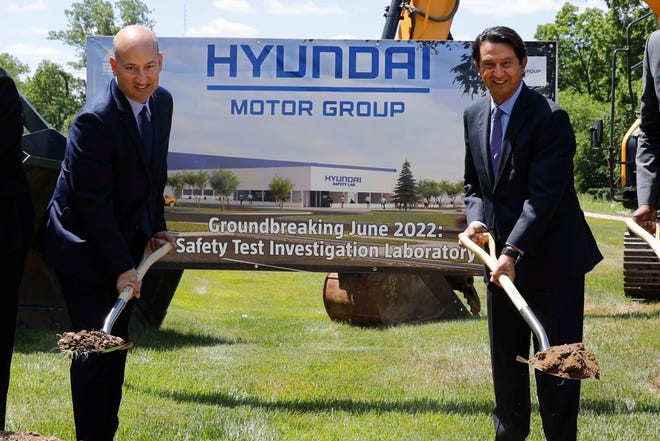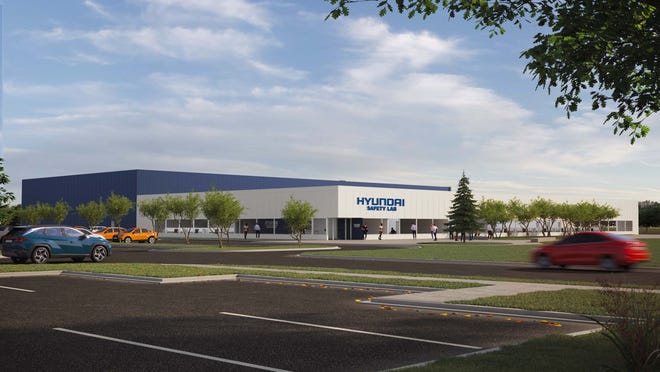Drawing on Metro Detroit’s extensive engineering talent, Hyundai broke ground this week near Ypsilanti on its new Safety Test and Investigation Laboratory, its first such facility in North America.
STIL expands on the Hyundai America Technical Center, one of six Hyundai R&D centers worldwide. The new facility, which satisfies a consent order from the National Highway Safety Administration, will augment existing safety testing and analysis for Hyundai and Genesis luxury brand vehicles. The facility will include a field crash investigation lab, high-voltage battery lab, forensics lab, and 3/10-mile test track.

The $51.6 million facility, being built in Superior Township, is expected to employ 150 people and be operational in the fall of 2023.
“Safety is the top priority at Hyundai and is embedded throughout the entire organization,” Hyundai Motor Company President and CEO José Muñoz said at the Monday groundbreaking. “We excel in third-party crash testing and ratings, and strive to be a leader in the latest safety features. The new laboratory will enable us to even more effectively protect our customers.”
Hyundai this year earned eight 2022 Top Safety Pick and Top Safety Pick Plus awards from the Insurance Institute for Highway Safety, placing third in the industry behind Volvo and Audi. Each of its SUVs won a Top Safety Pick award: the Venue, Tucson, Palisade, Santa Fe and Santa Cruz. Together with sister brands Kia and Genesis — which also placed in the IIHS Top Ten — Hyundai Motor Group had 21 Top Safety Pick awards.
The STIL comes in the wake of a consent order Hyundai agreed to with the federal government after NHTSA determined Hyundai and Kia had moved too slowly in an engine recall involving more than 1.6 million vehicles from 2011-2014. The Theta II four-cylinder engines were prone to seizing, and NHTSA faulted Hyundai for inaccurately reporting recall information. In total, Hyundai-Kia paid $210 million in fines.
The order required Hyundai to spend at least $25 million in the U.S. to “build and develop a fully-functioning U.S.-based outdoor test laboratory and vehicle tear down facilities.”
Munoz was joined at the event by Hyundai North America Chief Safety Officer Brian Latouf and Hyundai America Technical Center president John Robb, as well as government officials including U.S. Rep. Debbie Dingell, D-Dearborn, and Lt. Gov. Garlin Gilchrist II.
“This investment by Hyundai is critically important not only to southeast Michigan but to our entire country,” said Dingell. “This new Safety Test and Investigation Laboratory will save lives, and I applaud Hyundai for their commitment to keeping passengers safe.”

Gilchrist added that “Hyundai’s cutting-edge Safety Test and Investigation Laboratory will create good-paying, high-skilled jobs right here in Michigan. Michigan put the world on wheels, and I am grateful for Hyundai’s partnership in building on that tradition with a $50 million investment in Superior Township.
In addition to being home to Detroit Three headquarters and tech centers, Michigan has a technical workforce that has attracted large operations from foreign automakers.
Toyota’s largest research center outside of Japan (the Toyota Motor North American R&D Purchasing and Prototype Development Center), for example, is in York Township in southern Washtenaw County. And the Honda Research Institute-Detroit is next to the University of Michigan campus in Ann Arbor.
Hyundai’s Michigan lab comes in addition to the Hyundai Motor Group’s planned $10 billion investment in the U.S. by 2025, including its Georgia manufacturing facilities building electric vehicles and producing batteries.
Henry Payne is auto critic for The Detroit News. Find him at hpayne@detroitnews.com or Twitter @HenryEPayne.